Bremen (state)
Bremen (German: [ˈbʁeːmən] (![]()
Free Hanseatic City of Bremen Freie Hansestadt Bremen | |
|---|---|
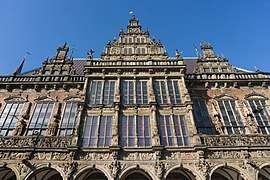 | |
 Flag  Coat of arms | |
%26groups%3D_caf4296c07343ef0c4e9009ed7275f2dc8cb2221.svg)
| |
| Coordinates: 53°4′33″N 8°48′27″E | |
| Country | Germany |
| Capital | Bremen |
| Government | |
| • Body | Bürgerschaft of Bremen |
| • Senate President | Andreas Bovenschulte (SPD) |
| • Governing parties | SPD / Alliance 90/The Greens / The Left |
| • Bundesrat votes | 3 (of 69) |
| Area | |
| • City | 419.38 km2 (161.92 sq mi) |
| Population (2017-12-31)[1] | |
| • City | 681,032 |
| • Density | 1,600/km2 (4,200/sq mi) |
| Demonym(s) | Bremer (m), Bremerin (f) |
| Time zone | UTC+1 (CET) |
| • Summer (DST) | UTC+2 (CEST) |
| ISO 3166 code | DE-HB |
| Vehicle registration |
|
| GRP (nominal) | €34 billion (2019)[2] |
| GRP per capita | €49,000 (2019) |
| NUTS Region | DE5 |
| HDI (2018) | 0.951[3] very high · 3rd of 16 |
| Website | bremen.de |
Geography
The state of Bremen consists of two separated enclaves. These enclaves contain Bremen, officially the 'City' (Stadtgemeinde Bremen) which is the state capital, and the city of Bremerhaven (Stadt Bremerhaven). Both are located on the River Weser; Bremerhaven is further downstream than the main parts of Bremen and serves as a North Sea harbour (the name Bremerhaven means "Bremen's harbour"). Both enclaves are completely surrounded by the neighbouring State of Lower Saxony (Niedersachsen). The two cities are the only administrative subdivisions the state has.
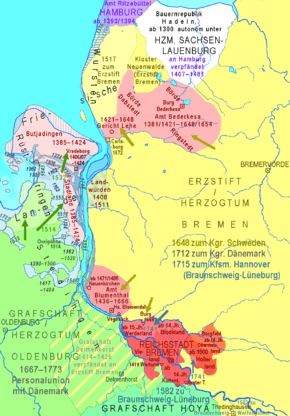
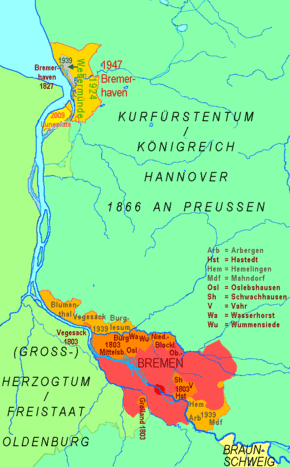
The highest point in the state is in Friedehorst Park (32.5m).
History
At the unwinding of the Holy Roman Empire in 1806 the Free Imperial City of Bremen (as of 1646, after earlier privileges of autonomy of 1186) was not mediatised but became a sovereign state officially titled Free Hanseatic City of Bremen. Its currency was the Bremen thaler (until 1873). In 1811 the First French Empire annexed the city-state. Upon the first, albeit only preliminary, defeat of Napoléon Bonaparte, Bremen resumed its pre-1811 status as city-state in 1813.
The Vienna Congress of 1815 confirmed Bremen's—as well as Frankfurt's, Hamburg's, and Lübeck's—independence after pressuring by Bremen's emissary, and later burgomaster, Johann Smidt. Bremen became one of 39 sovereign states of the German Confederation. In 1827 the state of Bremen bought the tract of land from the Kingdom of Hanover, where future Bremerhaven would be established. Bremen became part of the North German Confederation in 1867 and became an autonomous component state of the newly founded German Empire in 1871 and stayed with Germany in its following forms of government.
Bremen, which in 1935 had become a regular city at the de facto abolition of statehood of all component German states within the Third Reich, was reestablished as a state in 1947. Being—at that time—actually located in the British Zone of Occupation the Control Commission for Germany - British Element and the Office of Military Government for Germany, U.S. (OMGUS) agreed in 1947 to constitute the cities of Bremen and then Wesermünde—in their borders altered in 1939—as a German state named again Free Hanseatic City of Bremen, becoming at that occasion an exclave of the American Zone of Occupation within the British zone.[4] In 1949 the city-state joined the then West German Federal Republic of Germany.
Politics
Political system
The legislature of the state of Bremen is the 83-member Bürgerschaft (citizens' assembly), elected by the citizens in the two cities of Bremen and Bremerhaven.
The executive is constituted by the Senate of Bremen, elected by the Bürgerschaft. The Senate is chaired by the President of the senate (Senatspräsident), who is also one of the mayors of the city of Bremen (Bürgermeister) and is elected directly by the Bürgerschaft. The Senate selects of its members as a second mayor who serves as deputy of the president. In contrast to the Federal Chancellor of Germany or other German states, the President of the Senate has no authority to override senators on policy, which is decided upon by the senate collectively. Since 1945, the Senate has continuously been dominated by the Social Democratic Party.
On a municipal level, the two cities in the state are administered separately:
- The administration of the city of Bremen is headed by the two mayors and controlled by the portion of the Bürgerschaft elected in the city of Bremen (68 members).
- Bremerhaven, on the other hand, has a municipal assembly distinct from the state legislature and an administration under a distinct head mayor (Oberbürgermeister) and a distinct second mayor.
Political majorities
The political majorities in Bremen are based on a traditionally self-awareness of the Bremensians as liberal and open minded people. It is influenced historically by the pride to be an independent hanseatic city. Beside a trade-based class of merchants, in post-war Bremen, there was a majority of working class people, working at the shipyards. Since the 1990s the maritime industry has become more and more insignificant, but the priority to social themes in politics has remained.
Since the founding of the state of Bremen 1947, it has been ruled by a social democratic prime-minister. Comedian Jan Böhmermann, born and raised in Bremen said ironically that nobody in Bremen knowns anymore if there is a legislation or if it is just a scientific law that the mayor is always from the SPD.[6]
Historically the SPD has formed coalitions with FDP, CDU, Grüne and Linke.
The 2019 Bremen state election was held on 26 May 2019 to elect the members of the Bürgerschaft of Bremen, as well as the city councils of Bremen and Bremerhaven. The election took place on the same day as the 2019 European Parliament election.[7][8][9] The Christian Democratic Union (CDU) became the largest party in the Bürgerschaft, while the Social Democratic Party (SPD) fell to second place. The Greens and The Left made small gains. After the election, the SPD, Greens, and Left agreed to form a coalition government. Carsten Sieling resigned as mayor and was replaced by fellow SPD member Andreas Bovenschulte.[10][11]
Summary of the 26 May 2019 election results for the Bürgerschaft of Bremen
| Party | Votes | % | +/- | Seats | Total seats |
+/- | Seats % | ||
|---|---|---|---|---|---|---|---|---|---|
| Bremen | Bremerhaven | ||||||||
| Christian Democratic Union (CDU) | 391,709 | 26.7 | 20 | 4 | 24 | 28.6 | |||
| Social Democratic Party (SPD) | 366,375 | 24.9 | 19 | 4 | 23 | 27.4 | |||
| Alliance 90/The Greens (Grüne) | 256,181 | 17.4 | 13 | 3 | 16 | 19.0 | |||
| The Left (Linke) | 166,378 | 11.3 | 9 | 1 | 10 | 11.9 | |||
| Alternative for Germany (AfD) | 89,939 | 6.1 | 4 | 1 | 5 | 6.0 | |||
| Free Democratic Party (FDP) | 87,420 | 5.9 | 4 | 1 | 5 | 6.0 | |||
| Citizens in Rage (BiW) | 35,808 | 2.4 | 0 | 1 | 1 | 1.2 | |||
| Die PARTEI (PARTEI) | 24,433 | 1.7 | 0 | 0 | 0 | ±0 | 0 | ||
| Free Voters (FW) | 14,205 | 1.0 | 0 | 0 | 0 | ±0 | 0 | ||
| Pirate Party Germany (Piraten) | 14,143 | 1.0 | 0 | 0 | 0 | ±0 | 0 | ||
| Others | 22,915 | 1.6 | 0 | 0 | 0 | ±0 | 0 | ||
| Total | 1,469,506 | 100.0 | 69 | 15 | 84 | ||||
| Voter turnout | 64.1 | ||||||||
Coat of arms
The coat of arms and flag of Bremen state include:
 Flag of Bremen
Flag of Bremen Greater coat of arms
Greater coat of arms.svg.png) Medium coat of arms
Medium coat of arms.svg.png) Lesser coat of arms
Lesser coat of arms Coat of arms symbol/logo, free to use
Coat of arms symbol/logo, free to use
Economy
The unemployment rate stood at 9.5% in October 2018 and was the highest of all 16 German states.[12]
| Year[13] | 2000 | 2001 | 2002 | 2003 | 2004 | 2005 | 2006 | 2007 | 2008 | 2009 | 2010 | 2011 | 2012 | 2013 | 2014 | 2015 | 2016 | 2017 |
|---|---|---|---|---|---|---|---|---|---|---|---|---|---|---|---|---|---|---|
| Unemployment rate in % | 13.0 | 12.4 | 12.5 | 13.2 | 13.2 | 16.8 | 14.9 | 12.7 | 11.4 | 11.8 | 12.0 | 11.6 | 11.2 | 11.1 | 10.9 | 10.9 | 10.5 | 10.2 |
Education
The University of Bremen is the largest university in Bremen. Furthermore, Bremen has a University of the Arts Bremen, a University of Applied Sciences in Bremen and another one in Bremerhaven, and more recently the Jacobs University Bremen.
See also
- Bombing of Bremen in World War II
- Former countries in Europe after 1815
- Timeline of Bremen (city) history
References
- "Bevölkerung, Gebiet - Aktuelle Statistische Berichte - Bevölkerungsentwicklung im Land Bremen". Statistisches Landesamt Bremen (in German). September 2018.
- https://www.statistik-bw.de/VGRdL/tbls/tab.jsp
- "Sub-national HDI - Area Database - Global Data Lab". hdi.globaldatalab.org. Retrieved 13 September 2018.
- This situation earned the state its new prefix "AE" for vehicle registration, meaning "American Exclave", used until the federal reform of vehicle registration with effect of 1 July 1956.
- Evangelische Kirche in Deutschland – Kirchemitgliederzahlen Stand 31. Dezember 2018 EKD, January 2020
- https://www.brandeins.de/magazine/brand-eins-neuland/land-bremen-mut-macht-erfinderisch/eten-supen-un-pupen-dat-mook-buten
- "Bürgerschaftswahl 2019 in Bremen: Die wichtigsten Fakten im Überblick". www.merkur.de (in German). 5 April 2019. Retrieved 5 May 2019.
- "Bürgerschaftswahl 2019 in Bremen: Fragen und Antworten zur Wahl in Bremen". handelsblatt.com (in German). Retrieved 5 May 2019.
- "Bürgerschaftswahl 2019 - Wahlen zur Bremischen Bürgerschaft". landesportal.bremen.de (in German). Retrieved 5 May 2019.
- "Bremen: So tickt Andreas Bovenschulte (SPD)". 8 July 2019 – via www.welt.de.
- "Bremer SPD schließt Koalition mit CDU aus - buten un binnen". www.butenunbinnen.de.
- "Arbeitslosenquote nach Bundesländern in Deutschland 2018 | Statista". Statista (in German). Retrieved 13 November 2018.
- (Destatis), © Statistisches Bundesamt (13 November 2018). "Federal Statistical Office Germany - GENESIS-Online". www-genesis.destatis.de. Retrieved 13 November 2018.
External links
| Wikimedia Commons has media related to Bremen (state). |
- Official state portal
- Official governmental portal
- Constitution of the state, German only

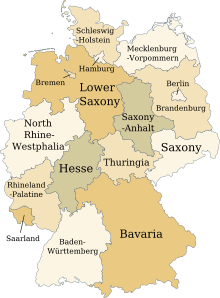

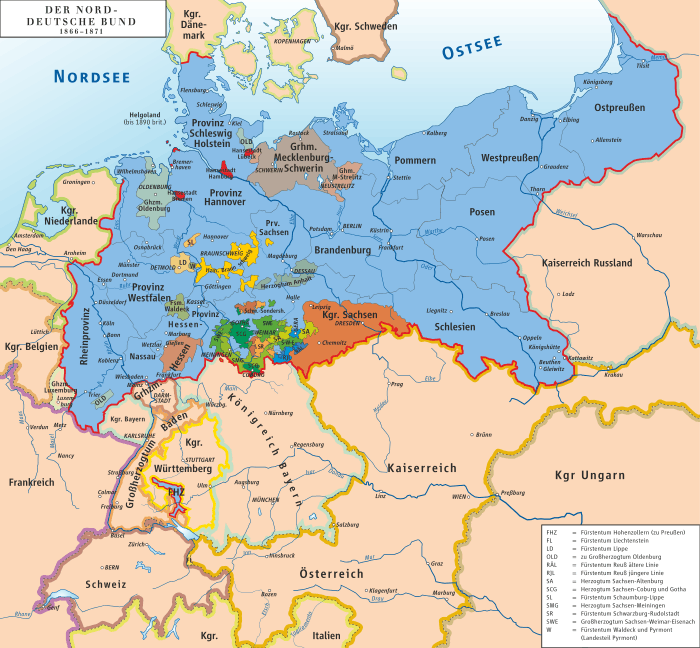
-en.png)
